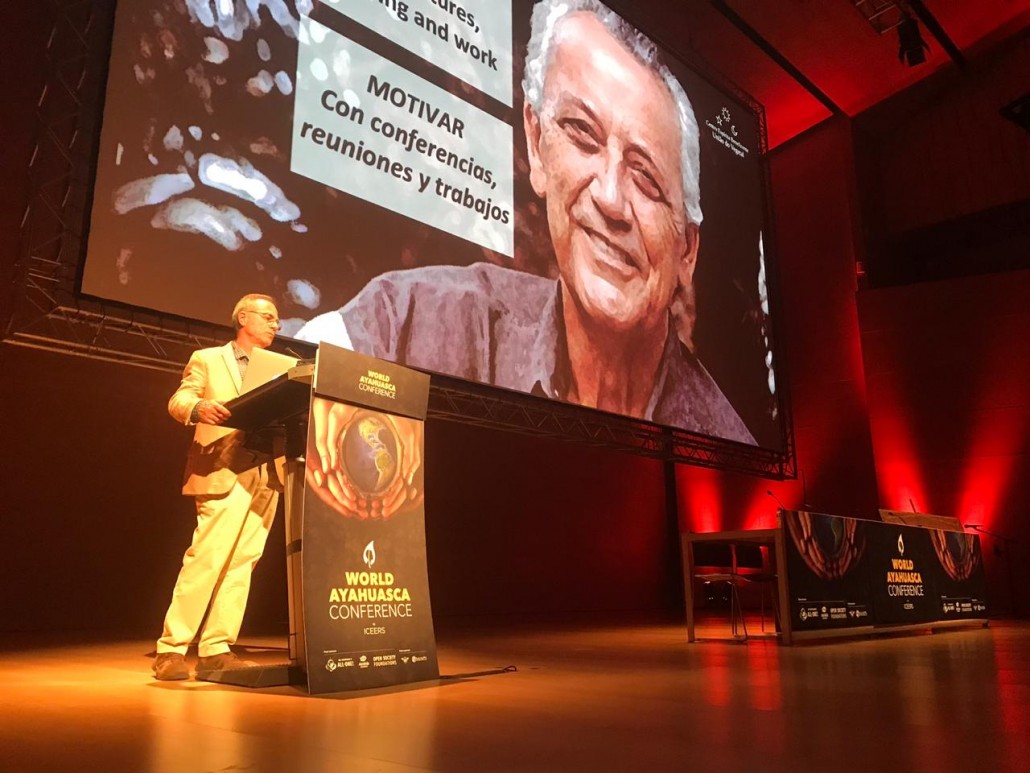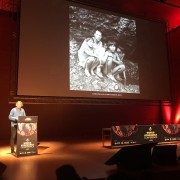World Ayahuasca Conference 2019: UDV shows care with the cultivation of Mariri and Chacrona
Five members of the União do Vegetal participated in the second day of the World Ayahuasca Conference 2019. On Sunday, June 2nd, four more associates of the UDV participated in the third and closing day of the event. See below a summary of the presentations made on Saturday, June 1st of 2019.
Jocimar Nastari*
| June 2, 2019
Girona (España) – El Centro Espírita Beneficente Unión del Vegetal trabaja con celo para promover el plantío de Mariri y Chacrona de forma sostenible, con respeto al medio ambiente y de forma que garantice la preservación de esas plantas. Este fue el mensaje central de la charla con el título “Medio ambiente y Cultivo de las Plantas Sagradas: La Experiencia de la UDV”, que el Mestre General Representante de la UDV, Paulo Afonso Amato Condé, realizó el 1 de junio, el segundo día de la III Conferencia Internacional de la Ayahuasca, en la ciudad de Girona, España.
Antes de abordar el tema central de su charla, en el auditorio principal del Palacio de Convenciones de Girona, Mestre Paulo Afonso recordó que el Té Hoasca es una Fuerza Espiritual poderosa con la cual la Unión del Vegetal trabaja con respeto y seriedad. Destacó que el Centro hace uso responsable del Vegetal y sólo en el contexto religioso. Hizo un breve histórico de la UDV desde su creación por Mestre Gabriel, con pocos seguidores, hasta los días de hoy, con cerca de 21 mil socios. Destacó el cuidado de nuestra religión con niños, jóvenes y personas ancianas. Habló además de la vocación que la Unión del Vegetal tiene con la preservación del medio ambiente y explicó el vínculo de la UDV con la Asociación Nuevo Encanto de Desarrollo Ecológico.
El Mestre General Representante dijo al público presente que la UDV trabaja para plantar y cosechar Mariri y Chacrona con calidad desde su inicio, siguiendo la orientación del Mestre Florêncio Siqueira de Carvalho (Mestre Florêncio – in memoriam), pionero en esa área en la Unión del Vegetal. Informó que, para aumentar la sostenibilidad y mejorar la preservación del medio ambiente, el Centro está consolidando el plantío por el método de Agroforesta (SAF) e implantando un Banco de Matrices de nuestras plantas sagradas.
Informó además que la UDV mantiene convenios y asociaciones con entidades científicas para estudiar el Mariri y la Chacrona, citó la Universidad de Brasilia (UnB) y el Instituto Nacional de Investigaciones de la Amazonia (Inpa). Concluyó su presentación informando que la Unión del Vegetal lanzó, el día 31 de mayo/2019, la web UDV-CIENCIA, con el objetivo de apoyar y difundir investigaciones científicas acerca del Té Hoasca.
History of institutionalization
Also in the principal auditorium, Mestre Edson Lodi Campos Soares, member of the Council of General Administration (Conage) of the UDV, offered the lecture “Brief History of the Institutionalization of the Religious Use of the Ayahuasca in Brazil”. Lodi informed the audience of the important role that the União do Vegetal had on the liberation of the tea and, thereafter, on the creation of rules for its use in religious settings in Brazil. He pointed out that the UDV participated actively in the interdisciplinary group that defined the basis for this and that the tea’s clearance should follow three basic precepts: the use of Hoasca Tea is restricted to religious settings, its use associated with any type of illegal drug is prohibited, and its commercialization is prohibited. Mestre Edson Lodi highlighted also that the UDV comes fulfilling the directives approved by the National Anti-drug Council respecting the use of the Vegetal.
Cooperative learning in the UDV
Cristiane Holanda, associate of Núcleo Inmaculada Concepción (Madrid, Spain), participated in the Community panel and presented the lecture, “Ayahuasca and Cooperative Learning: The Experience of the União do Vegetal”. She explained with respect to the preliminary results of her doctoral thesis for the Federal University of Ceará and by the University of Valladolid (Spain). Cristiane identified clear indications of the existence of the five elements that define cooperative learning as a way of being in the UDV: positive interdependence, promotive interaction, social abilities, individual responsibility and group processing.
Variation in the production of DMT
Ordilena Ferreira de Miranda, associate of Núcleo Lupunamanta (Campinas-SP), participated in the panel Phytochemistry and Ethnobotany, with the lecture “Can Environmental Characteristics Cause Variation in the Production of DMT (N,N-Dimethyltryptamine) in Psychotria viridis?”. She presented the preliminary results of her doctoral thesis research for the University of São Paulo (USP), with Mariri and Chacrona collected in 2018, in different biomes of the Amazon region, such as the savannah and the dry lands in seasons of more and less rain. She detailed some morphological and anatomical differences in the Chacrona, related to the biosynthesis and concentration of the active agent, DMT. She highlighted the importance of cultivars in diverse regions of Brazil and cited the necessary care for the good development of these species.
Challenges in Europe
Jeffrey Bronfman (Responsible Mestre for the Authorized Distribution of Vegetal of Hawaii, USA and Vice President of the General Directorate of the UDV) participated in the panel entitled, “Envisioning the future: Towards sensible, human rights-based policies for ayahuasca practices”.
Beside the other participants, he made a report on the legal case that the União do Vegetal moved for the legislation of the religious use of the Vegetal in the United States, arriving at the favorable unanimous decision of the Supreme Court of the USA.
Mestre Jeffrey and the other lecturers, João Goulão and Charlotte Walsh, also analyzed the challenges for the legislation of the use of the Vegetal in Europe.
Flávia Wenceslau
The singer Flávia Wenceslau (Núcleo Apuí, Lauro de Freitas, Bahia) made a quick presentation to the audience in the main auditorium of the event at the end of the morning works.
*Jocimar Nastari is a member of the Body of Counsel of the General Headquarters (Brasilia-DF) and Adjunct Director of the Department of Memory and Communication (DMC).
 English
English Español
Español



Leave a Reply
Want to join the discussion?Feel free to contribute!